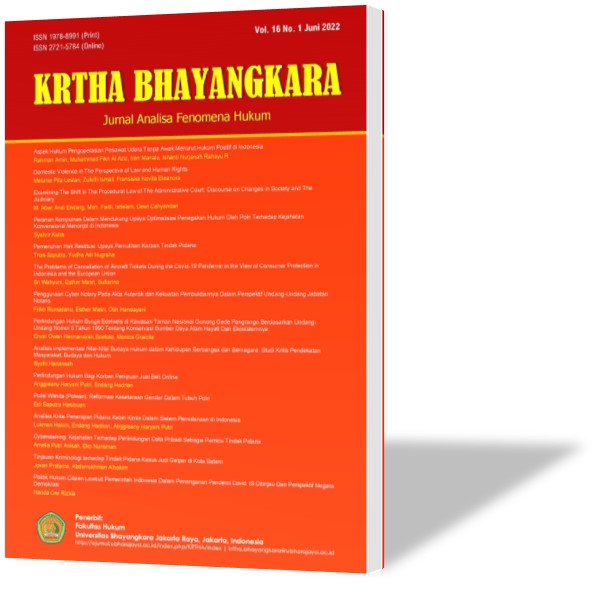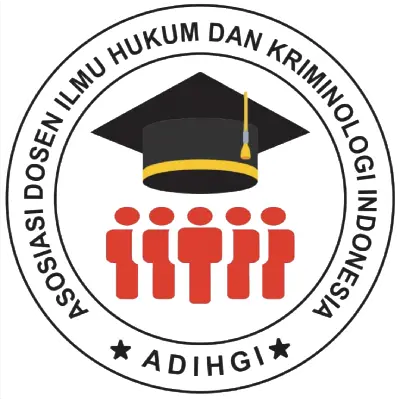Rehabilitation of Narcotic Addictives: An Overview of Implementation and The Effort by Restorative Justice
DOI:
https://doi.org/10.31599/krtha.v17i3.780Keywords:
Narcotics, Rehabilitation, Addicts, AttorneyAbstract
The progress of narcotics addictives is very concerning today and certainly requires comprehensive, integrated and continuous handling. However, in several cases, judges did not consider Article 103 of the Narcotics Law to provide rehabilitation for addicts and victims of narcotics abuse. Based on the background above, the problems that will be discussed in this study are: how is the implementation of the rehabilitation process for addicts and victims of narcotics abuse in Indonesia? And how does restorative justice apply to narcotics addicts through the rehabilitation process? This research is normative legal research with descriptive nature. The research results show that the implementation of rehabilitation for addicts and victims of narcotics abuse in Indonesia can be seen from the data for 2021 and 2022. It shows that the punishment for most narcotics addicts is imprisonment. So that efforts are needed from law enforcement officials prioritising rehabilitation for narcotics addicts to enforce restorative justice law. One of the efforts of restorative justice from law enforcement officials against narcotics addicts is the establishment of the Attorney General's Guidelines Number 18 of 2021 concerning the Settlement of Handling Cases of Crime of Narcotics Abuse through Rehabilitation with a Restorative Justice Approach as the Implementation of the Prosecutor's Dominus Litis Principle
References
Achmad Yuliandi Erria Putra, Mirawaty Nurhamidin, Dede Cairul, Law Enforcement in The Eradication of Narcotics Crimes Againts Drug Addicts and Abusers, Jurnal Dinamika Hukum, Vol. 22 No. 1 Tahun 2022. DOI: http://dx.doi.org/10.20884/1.jdh.2022.22.1.3244
Allegra M. Mcleod, Decarceration Courts, Possibilities and Perils of a Shifting Criminal Law. The Georgetown Law Journal, Vol. 100, No.1587, 2012.
Badan Narkotika Nasional, Pencegahan Penyalahgunaan Narkoba Sejak Dini, Jakarta, BNN, 2009.
Badana Narkotika Nasional, Journal Data BNN Tahun 2018, Jakarta.
Dadang Hawari, Penyalahgunaan dan Ketergatungan Narkotika, Jakarta: Fakultas Kedoteran Universitas Indonesia, 2012.
https://m.valoranews.com/berita/20267/tiga-berkas-perkara-tersangka-sabu-diselesaikan-secara-restorative-justice-perdana-di-sumbar.html, accessed on 01 December 2022
Dimas Jarot Bayu, dalam artikel https://katadata.co.id/ariayudhistira/analisisdata/61404dc0656ef/lapas-di-indonesia-menanggung-beban-berat, accessed on 03 April 2022.
Direktorat Statistik Ketahanan Sosial, Statistik Kriminal 2021, Jakrta: Badan Pusat Statistik, 2021.
Glenn Greenwald, Drug Decriminalization in Portugal; Lessons for Creating Fair and Successful Drug Policies, USA: Cato Institute, 2009.
https://databoks.katadata.co.id/datapublish/2021/09/17/narapidana-kasus-narkoba-mendominasi-di-lapas-indonesia, accessed on 1 August 2022.
Ilham Panunggal Jati Darwin, “Implikasi Overcapacity Terhadap Lembaga Pemasyarakatan di Indonesia “, Cepalo, Vol. 3 No. 2, 2019.
James Gilligan, 2012, Punishment Fails, Rehabilitation Works, December 19 2012, dalam http://www.nytimes.com/roomfordebate/2012/12/18/prison-could-be-productive/ punishment-fails-rehabilitation-works, accessed on December 10 2021.
Julianan Lisa FR dan Nengah Sutrisna W, Narkoba, Psikotropika dan Ganguan Jiwa, Yogykarta: Nuha Medika, 2018.
M. Amir P., Ali Imran Duse, dkk, Narkoba Ancaman Generasi Muda, Yogyakarta, Pustaka Timur, 2007.
Mikha Dewiyanti Putri, Prih Utami, Teddy Cipta Lesmana, The Implementation of Rehabilitation Assessment As Legal Protection For Narcotics Abusers in Indonesia, Jurnal Dinamika Hukum, Vol. 22 No. 1 Tahun 2022, DOI: http://dx.doi.org/10.20884/1.jdh.2022.22.1.3245
II. Moore, Contemporary Drug Problems, Sage Journals, Vol. 47, No. 3, 2020.
Muhammad Mustafa, Krimonologi: Kajian Sosiologi terhadap Kriminalitas, Perilaku menyimpang, dan Pelanggar Hukum, Jakarta, FISIP UI Press, 2007.
Novi Novitasi, Nur Rochaeti, Proses Penegakan Hukum Terhadap Tindak Pidana Penyalahgunaan Narkotika Yang Dilakukan Oleh Anak, Jurnal Pembangunan Hukum Indonesia, Vol. 3, No. 1, 2021.
Attorney General's Guidelines Number 18 of 2021 concerning Completion of Handling Cases of Crime of Narcotics Abuse Through Rehabilitation Using a Restorative Justice Approach as the Implementation of the Prosecutor's Dominus Litis Principle.
Prosecutor's Regulation No. 15 of 2020 concerning Termination of Prosecution Based on Restorative Justice.
Petrus Reinhard Golose, KABNN, dalam jumpa pers https: // www. voaindonesia. com/a/sepanjang-2021-bnn-ungkap-760-kasus-tindak-pidana-narkoba-/6375450.html#, accessed on 10 June 2021.
Riki Afrizal, Upita Anggunsuri, Optimalisasi Proses Asesmen Terhadap Penyalahguna Narkotika Dalam Rangka Efektivitas Rehabilitasi Medis dan Sosial Bagi Pecandu Narkotika, Jurnal Penelitian Hukum De Jure, Vol. 19 No. 3, September 2019: 259-268. DOI: http://dx.doi.org/10.30641/dejure.2019.V19.259-268.
Ruslan Renggong, Hukum Pidana khusus, Jakarta: Kencana, 2017.
Simbolon, Laurensius Arliman, Pelaksanaan assessment Oleh Polres Kepulauan Mentawai Sebagai Bentuk Pelaksanaan Rehabilitasi Bagi Pecandu dan Korban Penyalahgunaan Narkotika, Jurnal Muhakkamah Fakultas Hukum Universitas Nahdlatul Wathan Mataram, Vol. 5 No. 1, 2020.
Soekedy, Menyirambara Narkotika Semakin Tahu Akibatnya Semakin Siap Menolaknya, Mapeksi, Jakarta, 2002.
Suhadi, Rosdiana, Ries Fitri Amalia, Analisis Hukum Penerapan Pasal 103 Undang-Undang Nomor 35 Tahun 2009 Tentang Narkotika Terhadap Pecandu Narkotika Dalam Putusan No: 788/Pid.Sus/2019/PN Bpp, Jurnal De Jure, Vol. 12, No. 2, 2020.
Sumiati, Asuhan Keperawatan Pada Klien Penyalahgunaan & Ketergatungan Napza, Jakatra: Trans Info Media, 2016.
Taufik Makarao, Suhasril, dan Zakky A.S, Tindak Pidana Narkotika, Jakarta: Ghalia Indonesia, 2003.
Downloads
Published
Issue
Section
License
Copyright (c) 2024 Tofik Yanuar Chandra, Joko Sriwidodo, M.S. Tumanggor

This work is licensed under a Creative Commons Attribution 4.0 International License.



































